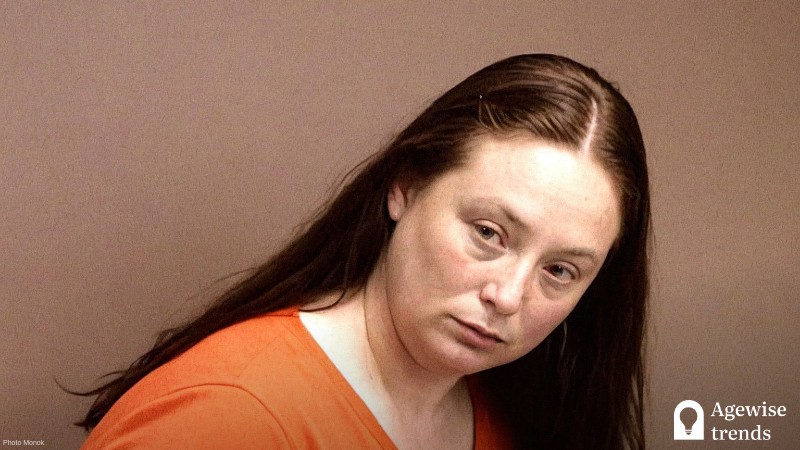A Zanesville woman was sentenced to life with parole possibly after serving 16 years for murdering her father-in-law. Authorities say the crime was financially motivated and covered up for weeks.
Brittany Cole, 34, pleaded guilty to murder and abuse of a corpse, admitting to administering a fatal overdose of Tylenol 3 with codeine and ZzzQuil to 80-year-old David Cole Sr. on Christmas Eve 2024. Rather than reporting the death, Cole concealed the crime, allowing the body to remain in the home while she and her family went on vacation.
Investigators later uncovered evidence of financial exploitation and a detailed plan to dispose of the body, leading to Cole’s swift conviction.
Key Takeaways
A Zanesville woman was sentenced to life in prison for poisoning her 80-year-old father-in-law and hiding his body for several weeks.
- Brittany Cole administered fatal doses of medication to her father-in-law and concealed his body while on vacation.
- The crime was financially motivated, with the family continuing to receive his Social Security benefits after his death.
- This case highlights the growing problem of elder abuse, particularly the financial exploitation of seniors by family members.
A calculated crime and cover-up
According to investigators, Brittany Cole deliberately poisoned her father-in-law on December 24, 2024, using medication from her daughter’s dental prescription. When David Sr. complained of pain, she gave him more, fully aware it would be fatal. By the morning of Christmas Day, he was dead.
Rather than alerting authorities, Cole instructed family members to lie about his whereabouts, claiming he had moved to Cincinnati. She then proceeded with vacation plans, taking her family to Orlando, Florida, from December 26 to January 1, while his body remained in the home.
The concealment of the crime continued after their return. On January 8, Brittany’s husband, David Cole Jr., discovered the decomposing remains. Instead of contacting law enforcement, he and Brittany exchanged text messages discussing how to dispose of the body. Investigators later recovered these conversations, which included discussions about the odor and logistics of moving the corpse.
At one point, David Jr. ordered a plastic mattress cover from Amazon Prime, which the couple used to wrap the body before moving it first to the sunroom and later to a shed. The body remained there until Zanesville police discovered it on February 10, following a 911 call.
Authorities later uncovered a key piece of digital evidence: Brittany’s Google search on the morning of December 25, which read, When someone dies, how long does it take for the body to start smelling? This, combined with financial transactions and surveillance footage, solidified the case against her.
Financial motive and ongoing investigation
Beyond the murder and concealment, investigators determined that financial exploitation was a significant factor in the crime. David Cole Sr. received $2,300 in monthly Social Security benefits, which continued to be deposited into a bank account managed by his son, David Jr.
Rather than reporting his father’s death, David Jr. continued accessing these funds, transferring money to Brittany for household expenses. Bank records confirmed that CashApp transactions were made in December and January, covering bills such as water and other utilities.
She not only ended her father-in-law’s life but then exploited his death . . . hiding the truth for weeks while manipulating her family.
Ron Welch, Muskingum County Prosecutor
Muskingum County Prosecutor Ron Welch called Brittany’s actions a ‘shocking betrayal’ and emphasized the disturbing nature of the case, particularly in how she exploited the victim even after his death.
Assistant Prosecuting Attorney John Litle highlighted the broader issue of elder abuse, pointing out the dangers of financial and physical mistreatment of vulnerable individuals. While Brittany Cole has been convicted, charges against David Cole Jr. remain pending as authorities continue to investigate his level of involvement.
Judge Gerald Anderson, who presided over the case, imposed the maximum sentence, ensuring that Cole would serve at least 16 years before being eligible for parole. Prosecutors noted that the speed at which the case was resolved reflects the efficiency of the Muskingum County justice system, which is known for delivering consistent and meaningful penalties in serious cases.
Elder abuse and the need for oversight
The case of Brittany Cole underscores the growing concern over elder abuse, a crisis that has worsened in recent years. Studies indicate that 1 in 5 elderly adults in the United States experiences some form of abuse, with financial exploitation being one of the most common.
The COVID-19 pandemic further exacerbated the issue, leading to increased isolation of elderly individuals and limiting access to community support. Data suggests that in 90% of elder abuse cases, the perpetrators are family members, most often adult children or spouses.
Beyond financial abuse, elder neglect and mistreatment are widespread issues in nursing homes and long-term care facilities. Many institutions suffer from understaffing and inadequate oversight, leading to substandard care and, in some cases, outright abuse.
Elderly woman abused by ‘nursing home employee’.
This is disgusting and truly evil. pic.twitter.com/aZPIDiZbfM
— iamyesyouareno (@iamyesyouareno) July 13, 2023
A report by the World Health Organization found that 66% of nursing home staff members admitted to mistreating residents under their care. Cases like Cole’s highlight the vulnerability of elderly individuals, whether they reside in private homes or senior living centers.
Prosecutors emphasized the need to recognize and prevent elder abuse, urging people to watch for signs of mistreatment and report concerns. Advocacy groups continue to push for stricter oversight and tougher penalties.
Brittany Cole’s conviction highlights the dangers elderly individuals face, especially from family caregivers. The investigation into her husband remains open, raising ongoing questions about accountability.















